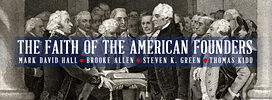I am grateful for the responses to my essay by Professors Allen, Kidd, and Green. I’ll briefly address comments about the founders and deism here, and then engage other issues after Independence Day.
Professor Allen suggests that I “conflate two quite different questions in [my] essay: first, whether the United States had a Christian founding, and second, whether the majority of the founders were, like the vast majority of the population at that time, believing Christians.” Similarly, Professor Green believes that I reason from the “ubiquity of religious trappings during the founding period” to the conclusion “that Christian ideas significantly influenced the thinking of the founders in ways that impacted the founding documents.”
Contrary to Professors Allen and Green, I am not conflating anything, but instead answer two separate questions. Jason Kuznicki, editor of Cato Unbound, asked me to write a short essay on “the religious beliefs of the American founders and why these beliefs still matter today.” In “Proclaim Liberty Throughout All the Land,” I address each issue in turn.
I could have described the religious beliefs of America’s founders simply by observing, like Professor Allen, that “the majority of the founders were, like the vast majority of the population at that time, believing Christians.” But, as I acknowledge in my essay, such a fact “is not particularly useful. These citizens may have been Christians significantly influenced by non-Christian ideas, or they may have been Christians self-consciously attempting to create a secular political order.”
(Ironically, Professor Allen concedes more than I argue. I write that “virtually every American of European descent in the founding era … identified himself or herself as a Christian.” But some citizens might have done so to conform to societal expectations, not because they were “believing Christians.”)
Rather than simply state the uncontroversial fact that virtually all late eighteenth century Americans identified themselves as Christians, I chose to address the common assertion that “most” or “many” of America’s founders were deists. Far too many sensible scholars make these or similar claims, including Professor Allen (“The Founding Fathers were … skeptical men of the Enlightenment who questioned each and every received idea they had been taught”) and Professor Green (“Although many of the nation’s elites privately embraced deism, The Age of Reason and other works popularized irreligion among the laboring and working classes”).[1]
In addition to Professors Allen and Green, academic and popular authors including Gordon Wood, Geoffrey Stone, Richard Hughes, Frank Lambert, Matthew Stewart, R. Lawrence Moore, Isaac Kramnick, Garry Wills, Steven Keillor, Richard Dawkins, and many others have claimed that America’s founders were deists.[2] Because this assertion is so widespread, it seemed worthwhile to set the historical record straight. In my short essay, and in Did America Have a Christian Founding?, I offer excellent reasons for rejecting this error. That Professors Allen and Green do not even attempt to refute my arguments suggest that I have succeeded.
Thomas Kidd agrees that the “textbook meaning of a deist, as Hall notes, is a person who believes theoretically in God as creator but not in God’s providential role in human history. If we stick with that definition, then there were almost no deists in Revolutionary America, save perhaps for radical skeptics like Ethan Allen and Tom Paine.” He goes on to observe that the “problem is that people in eighteenth-century Anglo-America did not always use our textbook definition of a deist.” I agree, and so discuss another common definition of deism, one that allows God to intervene in the affairs of men and nations. I argue that even using this definition, there is no good reason to conclude that America’s founders were deists.
Professor Kidd points out that “deism” could mean a variety of other things. For instance, it could be a charge leveled against someone “critical of Reformed theology and its emphasis on humankind’s lack of free will.” This may well be the case, but in late eighteenth century America, the subject of my essay, “deism” is virtually always used in one of the two ways I define it in my work. With few exceptions, scholars and popular authors writing about this era adopt one of these two definitions, including writers as diverse as Alan Wolfe, Christopher Grasso, Andrew Seidel, and Susan Jacoby. Perhaps Professor Kidd is suggesting that we reject “deism” as a useless concept, but if he is not it seems most reasonable to utilize the two common definitions discussed in my essay (perhaps acknowledging in a footnote that there are other possible meanings of the term).
After establishing that there is no good reason to conclude that “many” or “most” of America’s founders were deists, I state that “I do not argue that most of America’s founders were orthodox Christians.” I never rely on the religiosity of America’s founders to prove anything. Instead, in the second part of my essay, I “focus on the influence of Christian ideas on America’s founders.” I’ll turn to these arguments after July 4.
Notes
[1] Brooke Allen, Moral Minority: Our Skeptical Founding Fathers (Chicago: Ivan R. Dee, 2006), xiii; Steven K. Green, The Second Disestablishment: Church and State in Nineteenth-Century America (New York: Oxford University Press, 2010), 87.
[2] Mark David Hall, Did America Have a Christian Founding (Nashville: Nelson Books, 2019), 168-69.

